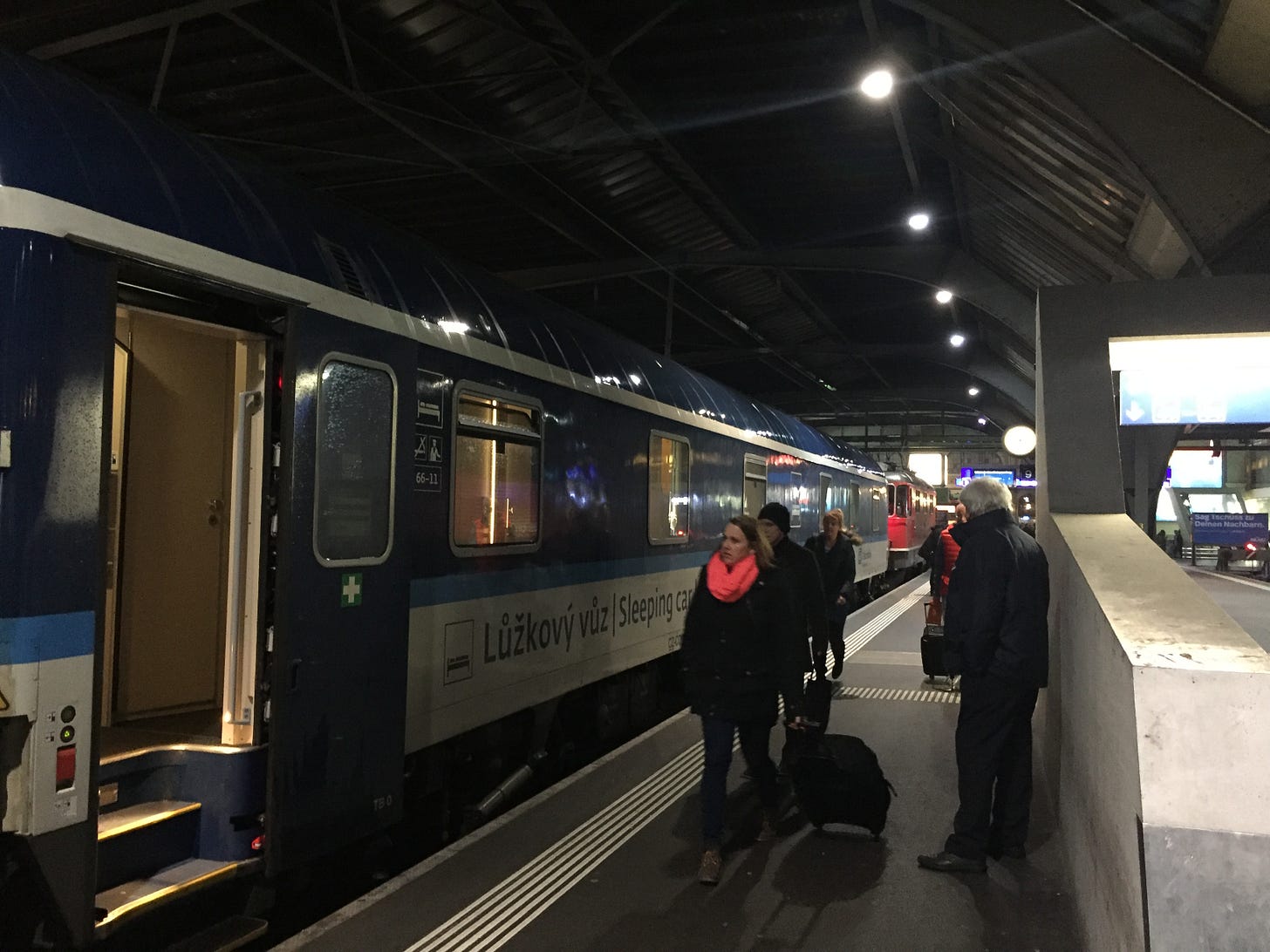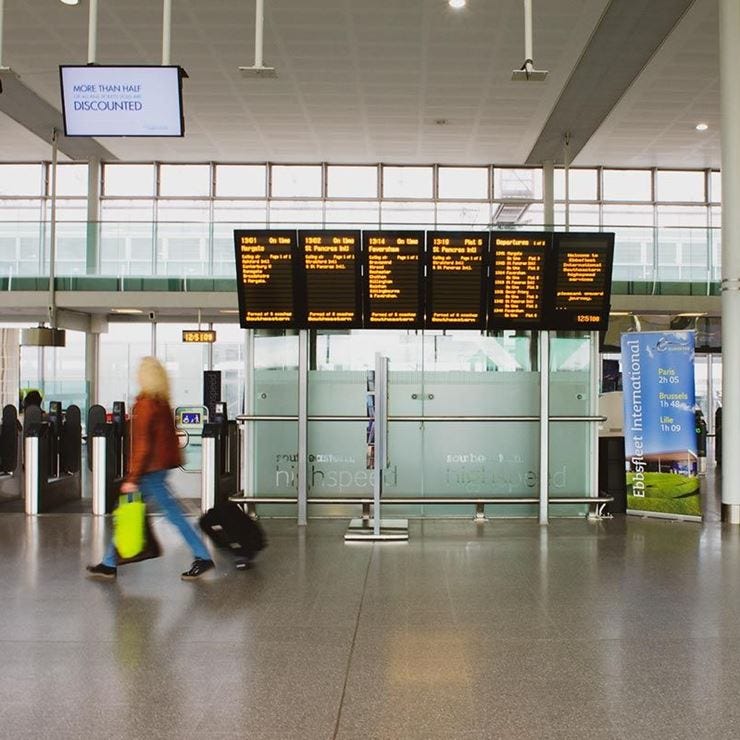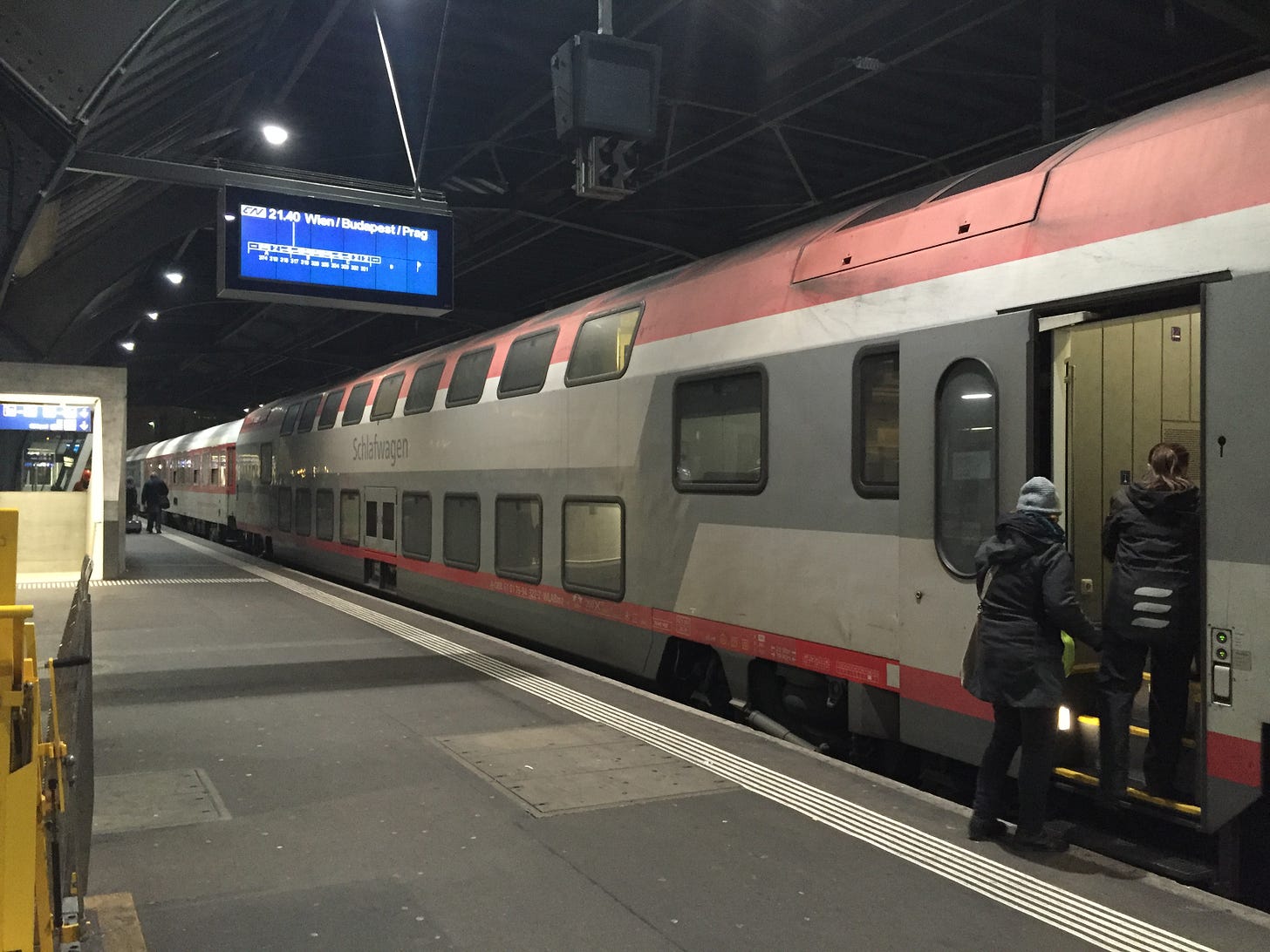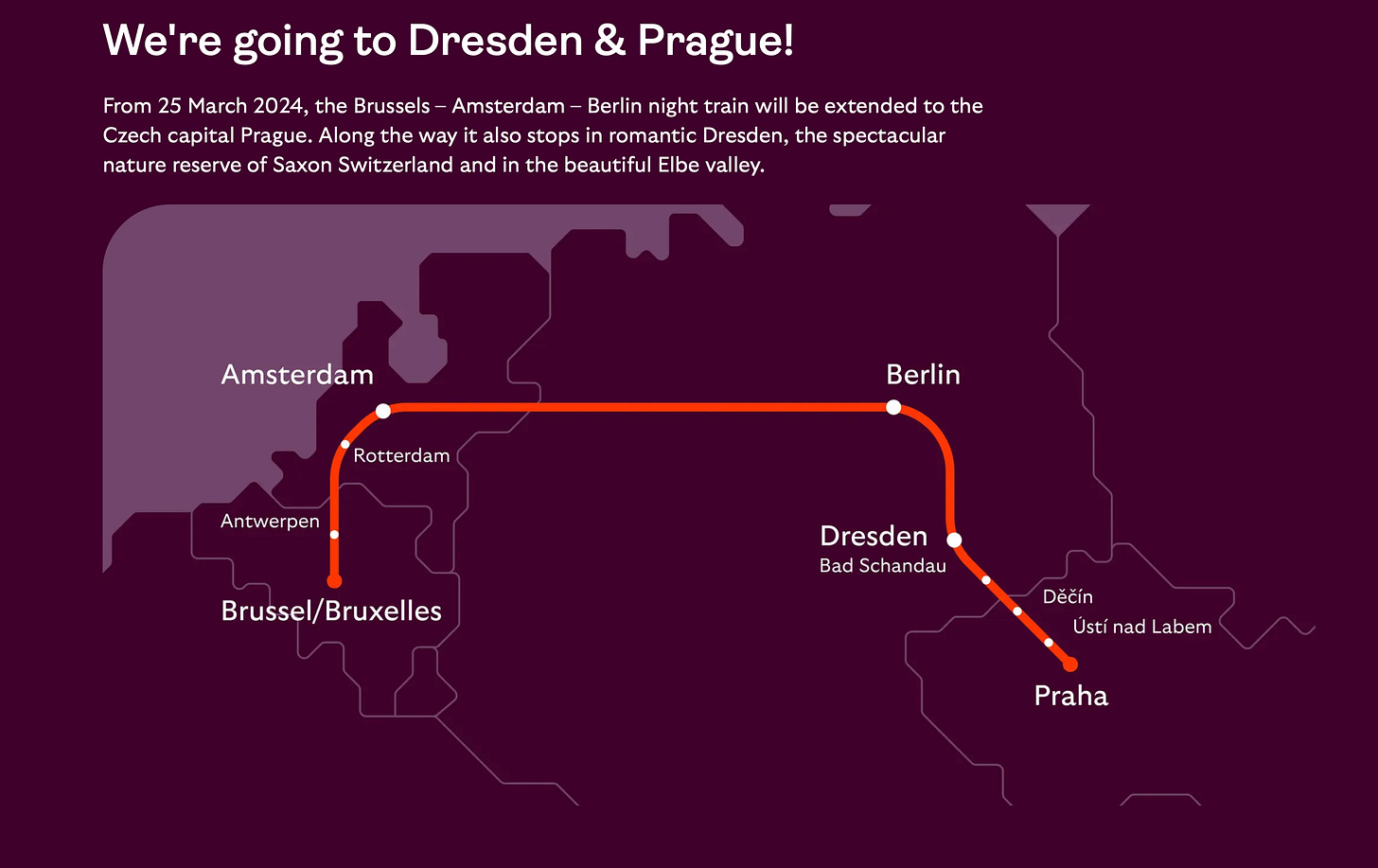Yes, London to Prague overnight is back!
But jungle law applies...
“It's easy to travel from London to Prague by train, and affordable too.”
That is not my opinion, but that of the legendary Man in Seat 61, the ultimate Rail Advocate, whom I introduced to readers in my post about the “ticket jungle”. And up until 7 years ago, I could endorse his view to friends, provided they were not in a hurry to get to their destination, were ready to see the journey as fun, and ready to take a night train. In 2016, despite Brexit, Eurostar was still flourishing.
What’s more, I didn’t need to go into Central London to board it, when staying with my sister in South-East London. She could drop me off at Ebbsfleet International station after a 20 minute car journey from her house in Eltham (It would take more than an hour to get to St Pancras from her house)
I would stroll into the light, modern station building, through the ticket turnstile, get a quick scan of my passport, and put my case through the luggage scanner (no undressing, or separation of iPad and liquids necessary here), and enter the departure lounge for a coffee before they called me to the platform. It was the most civilised, modern way to start a European journey. When I was a kid, I dreamed of this. I loved Ebbsfleet, and Eurostar.
But the storm clouds were gathering. The government sold off the U.K. share in Eurostar to France. Then came Brexit; and then the pandemic which Eurostar - now merged with Thalys- used as an excuse to close Ebbsfleet and Ashford stations. They remain closed today. But there is continuous pressure to re-open them, maybe you’d like to sign this petition…
The biggest blow to my rail journeys back to Prague, though, came not from the UK, but Germany. My route had been as follows
Eurostar to Brussels
DB ICE or Thalys to Cologne
Night sleeper from Cologne to Prague, in a České dráhy sleeping car.
In 2016 DB announced it was pulling out of the night train market. It happened with the change in timetable in December that year. I travelled on it several times in 2016 and the sleeping car was always full. But DB were adamant. I have never forgiven them for this.
An alternative route appeared, though:
Eurostar to Paris
TGV Lyria to Zürich
Night sleeper from Zürich to Prague, in a České dráhy sleeping car.
But I didn’t like it. The TGV journey to Zürich was 4 hours, and there was not enough time to have a nice dinner there, as I had done in Cologne. With great sadness, I concluded that the world was going backwards, and sleeping cars would disappear. I would be forever flying between Prague and London.
The Viennese knights to the rescue
ÖBB had other ideas of course, as we discussed in my previous post. The new route via Zürich was an ÖBB NightJet service, which also carried passengers on to Budapest, and even as DB pulled out, ÖBB had identified that the European market was solid and likely to grow. They expanded their routes as fast as they could find the coaches to run the new trains, even launching new services during the pandemic. This seemed to inspire more private operators, including Regiojet which started its now famous summer sleeper to Split; and more relevant to me, a new company, European Sleeper, announced that it would run from Brussels to Berlin, and later onwards to Prague - more on them below.
The sleepers are back, then. So what’s your problem?
Some tickets go on sale (much) earlier than others
the big European timetable changes in December and June each year, causing confusion between countries and delaying the start of ticket sales
By the time NightJet tickets are on sale, Eurostar tickets are expensive
ČD sleeper prices have increased by 63% compared with March 2020.
I need to go to London early in February; and I’d like to do it the old way; fly in, and return by train. I did not fancy having to leave the European Sleeper in Berlin at 6 o'clock in the morning, and then wait for the Euro City train that would not get me to Prague until lunchtime. It is listed as option No.1 in the man in Seat61’s list of five “easy and affordable” ways to get from London to Prague, but I’m not a morning person! I was interested in his second option. It is
Eurostar to Paris
TGV from Paris to Karlsruhe
EuroNight sleeper train from Karlsruhe to Prague
Karlsruhe? Yes. The sleeper train starts in Basel, runs to Zürich and reaches Karlsruhe at just after 23.00. Of course only The Man in Seat 61 could spot this connection and explain to everyone how to organise it. For me it looked straightforward, certainly no more challenging than the journeys I made pre-pandemic which also involved purchasing three tickets for three different trains. Unfortunately it was not straightforward, and while the problems might be partly caused by the big change to the winter timetable which always happens across Europe early December, the process could certainly confuse less experienced passengers.
Here is the issue: Railway operators differ greatly in how long in advance they will accept bookings. This is particularly problematic for international trains around the time of the big timetable change (December, and June). The “Karlsruhe” sleeper (named Canopus) is partly an ÖBB train carrying the NightJet brand, and running to Berlin. When it stops in Leipzig, the three Czech coaches are detached to create a EuroCity train to Prague. But most of Canopus’ journey is across Germany, and ČD told me earlier this month that it could not start selling tickets until DB Netz (the German infrastructure manager) confirmed the route. Meanwhile Eurostar and SNCF (operator of the TGVs) have no such problems, it seems. In particular Eurostar does not worry about the European timetable change, you can buy their tickets months in advance – and you need to because they operate an aggressive dynamic pricing system, and have been deliberately restricting the number of seats they have for sale, because (they say) it is taking too long to process a full train-load of 900 passengers through the border and security checks at St. Pancras station. It’s just another example of the many Brexit advantages.
So I was caught between two different dynamics. On Eurostar prices were already starting to rise; each day in which I delayed booking potentially cost me more; on the other hand the EuroNight train was officially not available to book at all more than 60 days in advance. In the middle was SNCF, and they turned out to be the one purveyor of good news; tickets were on sale for the train I needed, and what's more a few were available at really excellent prices. I decided to book my tickets to Karlsruhe, figuring that if the worst came to the worst, I would stay overnight in Karlsruhe and take day trains back to Prague. But not many people would be able to be so relaxed about the time they take to get home.
“Affordable” ? Hmm.
I got a standard class ticket on Eurostar for €98. It could have been worse (and probably will be by the beginning of December, 60 days before I travel). I could have been tempted to upgrade to what they call Standard Premier, but the price was astronomical: €230. Don’t even ask about First Class!!
Those prices look even more ridiculous when you compare them with my TGV ticket. I was offered €39 in standard class, and just €49 in First class. I grabbed the First class seat of course! And by the way the SNCF Connect website has had a big makeover, and will “talk” to you in perfect English and a friendly tone of voice. Merci beaucoup, mes amis😉
Of course Eurostar will say that the price is based on demand; however Eurostar is a monopoly operator which is restricting supply. There is talk of rival operators looking to launch services through the tunnel, but at the moment it’s just talk. I used to love Eurostar; now I seriously dislike them.
In the meantime I tried to book the sleeper. At first I could not buy the tickets at all on www.cd.cz, even though the train was in the timetable. After I wrote them, ČD explained that they were still waiting for the final route confirmation from DB Netz.
After a few days, the tickets became available.
For those not familiar with night trains, The Man fully explains the choices, with photos; the cheapest tickets are in the couchette car, where you basically sleep with bedsheets and pillows on the seats. This might be OK for younger people, especially travelling in a group.
The sleeping car provides you with a proper “bed” experience, a thin mattress as well as sheets and pillows. The ČD sleeping car has some de-luxe compartments which have their shower and loo in the compartment. Otherwise there’s a shower as well as loo at the end of the coach. If as a solo traveller you don’t mind sleeping in the same compartment as strangers (but always of the same sex) you can choose a 2 or a 3-bed compartment. Otherwise you, naturally pay a premium for solo occupancy in a compartment. Of course if you are a couple, and even more so with one child, the price per person comes right down.
But travelling solo at my age I definitely prefer some privacy, and it seems ÖBB don’t think I am so strange, as their newest NightJet coaches have new “pods” for solo occupancy. So I was happy to pay the high prices; in the last few years before the pandemic, the price for a de-luxe sleeper, solo, was usually 4,100CZK. Expensive enough, but the railway companies argue that it’s comparable with the price of a hotel room. I’m not sure about that argument since most people would otherwise fly to the same destination. But I could just about put up with it, especially in the good old days when Eurostar co-operated with DB and would sell me a ticket from London to Cologne for just £59 (€67). So London to Prague was around €235. In those days I could agree with The Man in Seat61; easy (once you understood why you need three tickets) and affordable.
But as they had predicted, a few days later ČD were able to sell me the ticket. I got a shock. They’re asking 6,000CZK for the de-luxe ticket. I was so shocked, I wrote to them to ask if it wasn’t a technical error. No, they said, in January we are charging 6,700CZK. I should have acted there and then, but I was more worried about Eurostar and by the time I went back to buy the ticket (today, 21st November) sure enough the price had gone up to 6,700CZK. Wow. So I decided that I would just forget about the private shower and WC, and buy the standard sleeper compartment for “only” 5700CZK. Then I discovered that if I bought it on www.oebb.at I would save another €8, so in a small act of revenge, I bought it from them. Grrr.
So here’s the final bill
Eurostar, London - Paris, standard class: €98
TGV, Paris - Karlsruhe, first class: €49
ČD/ÖBB, Karlsruhe -Prague, sleeper standard: €229
TOTAL € 376
and here is the worst thing about that price: it happens that my sister’s house is also close to London City Airport, which is probably my favourite airport thanks to its tiny size, retro walk from the plane to the terminal building, and if you are lucky, a final pirouette on your plane around the Shard before your final descent . For a while British Airways flew there from Prague but they stopped it during the pandemic and again I thought it was gone forever. Wrong! They have added three flights per week back in to the timetable. And how much were they ready to charge me, that week, in Club class, to fly me back to Prague? €191. Yes, almost half the price…
Yes, but..the environment
The environmental argument for more night trains is strong. Eurostar, to its credit has always tried to explain the environmental benefits of rail travel, and this page shows that, among other things, a journey by Eurostar to various destinations emits 93-98% less CO2 than the equivalent journey by plane, and roughly similar figures will be achieved by the other trains (which on the routes discussed here are all electrified). So you may pay more than if you take the plane, but you are certainly helping the fight against climate change. Our governments should do more to support our efforts of course: e.g tax kerosene (aircraft fuel, currently the only type which is untaxed) and/or impose a flight tax, to level up the competition; and perhaps a “green rebate” subsidy for night train tickets.
At the end of the tunnel..is that a light?
European Sleeper is a new private company set up in 2021 by two young Dutch entrepreneurs with “a great passion for night trains”. They faced considerable scepticism, not least from Jon Worth, who wondered whether they would be able to find sufficient coaches to lease. In addition their company structure was unusual: a co-operative, which raised capital through crowd-funding. Their first route was meant to connect Prague with Amsterdam and Brussels. I thought this was fantastic, as I could never understand why DB did not extend the Cologne sleeper to Brussels. I knew from experience in the UK that politicians and “Eurocrats” would use such a service and be able to pay the top price for last minute bookings. The service finally launched in May this year but only running as far east as Berlin; DB Netz could not or would not give them a “path” south from Berlin to Prague due to track upgrade work. Happily that work has finished and European Sleeper will first arrive in Prague this year on March 25th. And yes, I’m one of 2,000 shareholders. How could I resist this challenge to put my money where my mouth is?
So what do we learn from all this?
The EU needs to set up a Europe - wide Rail Regulator (that’s easier said than done, of course)
The Regulator would insist on agreed times for opening bookings for all long distance international journeys. Despite Brexit, this would include Eurostar, since it runs into and within the EU (and is French owned)
The Regulator would stop rail operators charging different prices to each other for seats on the same train.Ultimately it would drive forward the set-up of an EU - wide ticket portal
More sleeper train capacity is urgently needed, to help bring down prices - the EU-level solution to this, proposed by Jon Worth, was presented in the previous blogpost.
The next UK government needs to work with the EU to improve use of the HS1 line for the benefit of all passengers. (There is plenty of spare capacity on HS1, but apparently there is a problem around Lille)
The Rail Advocate’s tips (mostly passed on from The Man)
For this and any other journey involving more than one ticket or rail operator, consult The Man in Seat 61 before booking anything. He will walk you through both the formal and informal steps
e.g. Eurostar arrives in Paris Gare du Nord. He will explain to you how to get from there to Gare du Lyon if you are travelling to Basel or Zurich (RER or metro, a minor inconvenience but OK; maybe a taxi if you have more luggage). Whereas the TGV to Karlsruhe leaves from Gare de l’Est, and that, he tells you, is just 7 minutes walk from Nord. Good to know!
He has tips for restaurants and cafes around all the major stations, for when you have some time to wait for your connection. That includes waiting for the train in Karlsruhe until 23.00.
Don’t worry about waiting for your sleeper train until such a late hour. I often took it at this time from Cologne, and the station remained quite busy and friendly. Outside, in Dom Square, things can get “interesting” but that’s another story!
But if you’d rather get to sleep earlier, The Man will walk you through how to pick up the train in Basel by taking a different TGV from Paris.
Another of his great tips: if you are travelling in a sleeper with no en-suite shower, take your shower just before you are ready to sleep, and avoid the queue in the morning. Smart!
In the ČD sleeping car you get a light breakfast, served in your compartment. But on the Canopus, in the morning at Leipzig you are joined with other ČD coaches to form train EuroCity 459, and that includes a ČD/JLV restaurant car, so you can enjoy a hot breakfast while watching the Elbe/Labe river slip by. And yes, I suppose you could have a draught Pilsner Urquell too😉. It is very unusual across Europe nowadays to have a night train with a restaurant car (although still normal in the UK) so please go along and enjoy, to encourage ČD to keep it running.
Canopus runs in the opposite direction too of course, leaving Prague 18.26, and you can have dinner in the restaurant car. But it arrives at Karlsruhe at 05.07…sorry, that’s not for me…
In 25th March 2024, European Sleeper is due to start its direct night train, Brussels-Prague. I believe that the existing train is already very popular, and tickets are already on sale for the first half of next year. Unfortunately the prices are basically much the same as on the Canopus, but if you are travelling to/from London it will still be cheaper since you will not need to take a TGV, and Eurostar to Brussels is also usually a bit cheaper than to Paris (and easier, no change of station) . “🎵Things..can only get better🎵”






